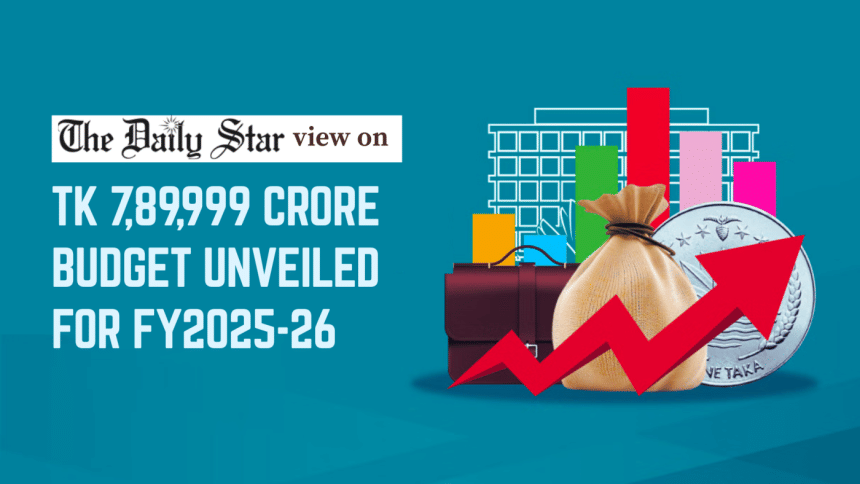
Last update on: Tue Jun 3, 2025 11:58 AM

As planned, the finance adviser to the interim government presented the national budget for FY2025-26 on Monday afternoon. And as anticipated, from the outset he highlighted the significant challenges his government has faced in stabilising the economy post-uprising, following widespread corruption and mismanagement under the now-ousted Awami League government.
Although it is impractical to expect too much from a budget proposed by an interim government that may not be in place to see it through to the end, a few aspects of it are quite notable. For starters, the proposed outlay is nearly 1 percent lower than the Tk 797,000 crore allocated in the outgoing fiscal year—a clear departure from the trend of previous years. While the decrease in budget size is not particularly large, it signals the government’s intent to tighten its belt in an effort to curb inflation.
The finance adviser has expressed the government’s intention to shift from a growth-centric approach to a concept of holistic development. Accordingly, instead of focusing solely on traditional physical infrastructure, the budget prioritises the well-being of the people. This includes placing special emphasis on education, health, good governance, civic facilities, and employment.
In line with this approach, the government has proposed expanding import duty exemptions on pharmaceutical raw materials and medical equipment in the upcoming national budget. The allocation for the Ministry of Health and Family Welfare has also been slightly increased, from Tk 41,407 crore in the outgoing budget to Tk 41,902 crore in the proposed one.
However, the allocation for the education sector remains below 1.6 percent of GDP, similar to what the outgoing budget formed under the Awami League government had provided, while being significantly short of the 4-6 percent of GDP recommended by the UNESCO. The interim government, being a non-political administration, had a rare opportunity to reset national priorities, but health and education—the two cornerstones of human development—have once again received inadequate attention.
The government has proposed an increase in both the number of beneficiaries and the per capita allocations under social safety net programmes in the proposed budget. However, when viewed in terms of GDP, spending on safety nets has actually decreased. What is positive, though, is the government’s expressed intention to streamline social safety net spending—an encouraging development, as this could help reduce much of the wastage that occurred under various such schemes in the past.
It has been evident for some time that the government’s fiscal space is shrinking, primarily due to low revenue collection. Acknowledging this, the government has outlined various revenue reforms that, if successfully implemented, could make a significant difference. Similarly, it has recognised the need for banking sector reforms and the recovery of a large portion of the stolen wealth. However, it has yet to provide details on how it plans to achieve such a monumental task.
The government has also allocated a Tk 405 crore fund for the rehabilitation of July warriors and the families of July victims, along with various other benefits for them. It goes without saying that the July uprising was at least partly driven by economic hardships, particularly those faced by the youth. With this in mind, the government has placed significant emphasis on young people and on generating employment opportunities. For example, the finance adviser has proposed a Tk 100 crore start-up fund in the budget to support emerging entrepreneurs. In addition, a substantial allocation has been set aside for women entrepreneurs, who will have easier access to loans without any collateral.
Moreover, the government is set to launch a new initiative titled “Tarunner Utshob,” aiming to harness the power and potential of the country’s young population by involving them more deeply in national development. Tk 100 crore has been allocated to celebrate this festival across the country. It is important to mention, however, that the government has not yet specified how this fund will be utilised, and we hope it will be transparent in this regard.
The agricultural sector has also been a focus of the budget, which is encouraging. To promote farming and meet the growing demand for food, the government has exempted up to Tk 5 lakh of annual income from agricultural activities from tax. In an effort to ease the burden on marginal farmers and suppliers, the government has proposed reducing the source tax on income from the supply of essential commodities—including paddy, rice, wheat, potato, jute, and tea leaves—to 0.5 percent from the next fiscal year. While this may not provide massive relief, it signals that the government is placing increased importance on the sector.
Aside from these, there have been three other notable proposals, including changes for the stock market such as widening the gap in corporate tax paid by listed and non-listed firms from 5 percentage points to 7.5 percentage points in order to encourage companies with good performance records to go public. The other proposals include raising the corporate tax rate for non-listed companies to 27.5 percent for the next two fiscal years, FY27 and FY28, thereby eliminating the existing concessionary rate of 25 percent; and incorporating homemakers’ contribution in GDP calculations.
While the budget may not be regarded as particularly radical, it contains several encouraging indicators. Nevertheless, the government must remain cognisant that achieving its revenue collection target could be challenging without significant reforms. And failure to meet this target may render the ambitiously low deficit goal of 3.6 percent unattainable.









